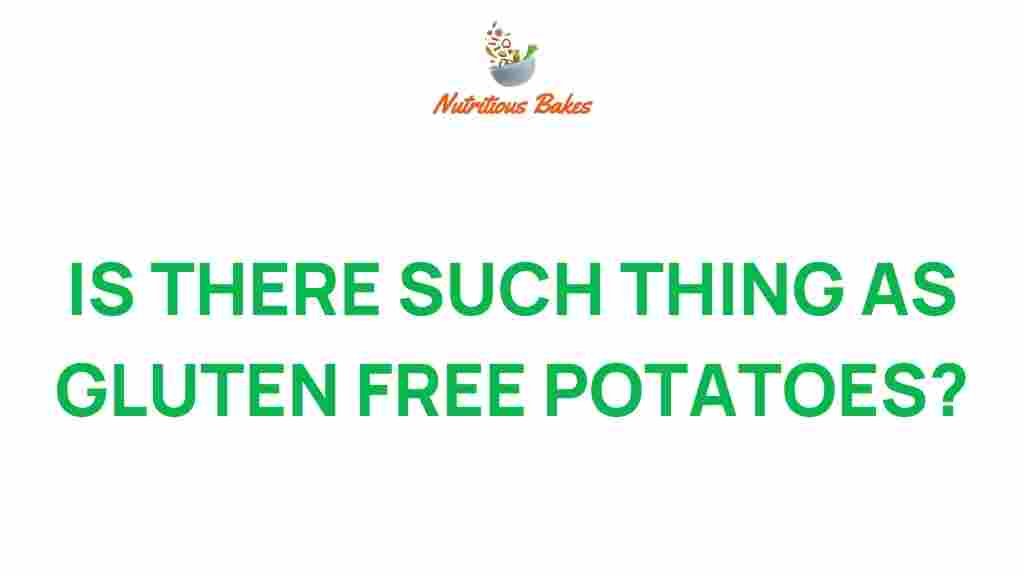Are Potatoes Truly Gluten-Free?
In the world of dietary choices, gluten has become a hot topic. For those with celiac disease or gluten sensitivity, understanding which foods are safe to consume is crucial. One such food that often raises questions is the potato. Are potatoes truly gluten-free? In this article, we will explore the relationship between potatoes and gluten, debunk some common myths, and provide insight into their nutritional value and health benefits.
Understanding Gluten and Its Impact on Health
Gluten is a group of proteins found in certain grains, such as wheat, barley, and rye. For individuals with celiac disease, gluten consumption triggers an autoimmune response that can damage the lining of the small intestine. Symptoms may include:
- Abdominal pain
- Bloating and gas
- Diarrhea or constipation
- Fatigue
- Weight loss
For those without celiac disease, gluten may still cause discomfort, leading to a trend towards gluten-free diets. Hence, the question arises: are potatoes a safe option for those avoiding gluten?
Are Potatoes Gluten-Free?
The straightforward answer is yes, potatoes are naturally gluten-free. As a starchy vegetable, potatoes do not contain the gluten protein found in wheat and other gluten-containing grains. This makes them a safe choice for individuals looking to maintain a gluten-free diet.
The Nutritional Value of Potatoes
Potatoes are not just gluten-free; they also offer a range of health benefits and nutritional value:
- Rich in Vitamins and Minerals: Potatoes are an excellent source of vitamin C, vitamin B6, and potassium.
- High in Fiber: When consumed with the skin, potatoes provide dietary fiber, which aids digestion.
- Low in Calories: Potatoes are relatively low in calories compared to many other starchy foods when prepared healthily.
Including potatoes in your diet can provide essential nutrients essential for overall health.
Common Myths About Potatoes and Gluten
Despite their gluten-free status, several myths persist regarding potatoes. Let’s address some of these misconceptions:
- Myth 1: All potato products are gluten-free.
While whole potatoes are gluten-free, processed potato products like certain chips or frozen fries may contain gluten due to added ingredients or cross-contamination. - Myth 2: Potatoes are unhealthy.
When prepared healthily (baked, boiled, or steamed), potatoes can be a nutritious part of a balanced diet. - Myth 3: Potatoes cause weight gain.
Weight gain is typically a result of overall calorie intake and lifestyle, not solely due to eating potatoes.
Cooking Potatoes: Tips for a Gluten-Free Diet
Cooking potatoes can be simple and delicious. Here are some tips to ensure you keep your potato dishes gluten-free:
- Choose Fresh Potatoes: Opt for whole, fresh potatoes rather than processed varieties.
- Avoid Cross-Contamination: When preparing potatoes, use clean utensils and surfaces that have not come into contact with gluten-containing foods.
- Check Labels: For any processed potato products, read labels carefully to ensure there are no gluten-containing ingredients.
Step-by-Step: Preparing Gluten-Free Potato Dishes
Here’s a basic guide to preparing a gluten-free potato dish:
- Choose Your Potatoes: Select fresh, firm potatoes (e.g., Russet, Yukon Gold) for the best flavor and texture.
- Wash and Peel: Wash the potatoes thoroughly to remove any dirt. Peel if desired, but keeping the skin retains more nutrients.
- Cut and Cook: Cut potatoes into even pieces. You can boil, bake, or steam them to preserve their nutrients.
- Seasoning: Use gluten-free seasonings like olive oil, herbs, and spices to enhance flavor.
- Serve: Serve your dish with gluten-free sauces or toppings to ensure a complete meal.
Health Benefits of Including Potatoes in Your Diet
Incorporating gluten-free foods like potatoes into your diet has several health benefits:
- Energy Source: As a carbohydrate-rich food, potatoes provide a quick source of energy.
- Heart Health: The potassium in potatoes can help regulate blood pressure and support cardiovascular health.
- Digestive Health: The fiber content in potatoes aids in digestion and promotes gut health.
For more information on maintaining a gluten-free diet, check out this comprehensive guide.
Troubleshooting: Common Issues When Cooking Potatoes
Even with gluten-free cooking, issues can arise. Here are some common problems and solutions:
- Problem: Potatoes are mushy after cooking.
Solution: Ensure you are not overcooking the potatoes. Test for doneness with a fork; they should be tender but firm. - Problem: Potatoes are bland.
Solution: Use various herbs and spices to enhance flavor. Consider adding garlic, rosemary, or paprika. - Problem: Skin is tough.
Solution: Try roasting potatoes at a higher temperature, which can result in a crispier skin.
Conclusion: Embracing Potatoes in a Gluten-Free Diet
In conclusion, potatoes are indeed gluten-free and can be a nutritious addition to your diet. They offer a wealth of vitamins, minerals, and fiber, contributing positively to overall health. By understanding the myths surrounding potatoes and following safe cooking practices, you can enjoy delicious potato dishes without worry.
As you continue your journey towards a healthier lifestyle, don’t hesitate to experiment with different potato recipes and cooking methods. Potatoes can be versatile ingredients in various meals, from salads to main dishes. So go ahead and embrace the goodness of gluten-free potatoes!
For more tips on gluten-free living, visit this resource page.
This article is in the category Ingredients and created by NutritiousBakes Team
